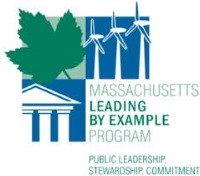- Home
- Campus Planning & Sustainability
- Sustainability & Resiliency
Sustainability & Resiliency
UMass Boston has a strong and longstanding commitment to improving operational sustainability while being a leader in environmental sustainability education and research.
Sustainable UMass Boston
Sustainable UMass Boston is a collaborative University effort integrating sustainability across academics, research, operations, and community engagement through the active participation of students, staff, faculty, and community partners.
The Chancellor's Sustainability Committee advises on goals and activities coordinated by Janna Cohen-Rosenthal, Sustainability & Resiliency Planner in the Office of Campus Planning & Sustainability. Progress to commitments is reported via multiple platforms.
"Our commitment to a healthy and sustainable community at UMass Boston will amplify sustainability initiatives at all levels. We seek to foster a consciousness of nature’s centrality to the human experience and our collective obligation to environmental sustainability. We understand that sustainability is not only about environmental and economic impacts, but it is about the overlap and interdependence of environmental and economic issues with restorative justice, equity, diversity, and inclusion." - Our Vision for the Future, Campus Master Plan, 2023
Updates
- Earth Month 2025 planning is under way!
- New Electric Vehicle Chargers are in West Garage & Campus Center
- Learn how to sign up for charging access through Transportation Services
-
Interested in learning more about EVs?
- Learn about the Sustainability Features in the New Quad
- UMass Boston Earns Silver STARS Rating for Sustainability Achievements, view the STARS report
- The Energy & Carbon Master Plan was released in Nov. 2023.
- Sign up for updates
Contact

Janna Cohen-Rosenthal
Sustainability & Resiliency Planner
Office of Campus Planning and Sustainability
Campus: x75582
Commitments & Performance Data at UMass Boston
UMass Boston has a goal of zero carbon emissions by 2050. The University is held accountable for this target and other sustainability progress by reporting data and collaborating with the following organizations:
Sustainability Tracking, Assessment & Rating System (STARS)

UMass Boston earned a STARS Silver Rating on Nov. 20, 2023! The Sustainability Tracking, Assessment & Rating System (STARS), is a transparent, self-reporting framework for colleges and to measure their sustainability performance. It is managed by the non-profit Association for the Advancement of Sustainability in Higher Education (AASHE).
View UMass Boston's STARS Report
Leading By Example

The Leading by Example Executive Order: Decarbonizing and Minimizing Environmental Impacts of State Government (EO 594) sets targets and requirements that will eliminate the onsite use of fossil fuels to heat and cool state facilities, electrify the state fleet, among a number of other directives. UMass Boston reports sustainability data annually to the LBE program.
View the LBE Progress Dashboard
University of Massachusetts President's Office

The University Of Massachusetts Sustainability Policy was adopted in 2016. The five University of Massachusetts schools, Amherst, Boston, Dartmouth, Lowell, and Chan Medical School, collaborate to discuss sustainability on their individual campuses to implement the policy and report their progress annually to the President's Office.
View UMass System Sustainability Reports
Climate Commitment

Higher education institutions whose president/chancellor have made a formal commitment to climate leadership by signing onto at least one of the Presidents’ Climate Leadership Commitments, managed by the non-profit Second Nature, become Climate Leadership Network signatories. UMass Boston signed the Climate Commitment, which integrates carbon neutrality with climate resilience and provides a systems approach to mitigating and adapting to a changing climate. In addition, signatories complete annual greenhouse gas inventories and a Climate Action Plan that includes:
- a target date for achieving carbon neutrality as soon as possible
- defined indicators and targets for increasing resilience
- actions to make carbon neutrality and resilience a part of the curriculum and other educational experiences for all student
- actions to expand research in carbon neutrality and resilience.
View Climate Commitment Greenhouse Gas Inventories
Additional Memberships & Affiliations
- Boston Green Ribbon Commission convenes leaders from Boston’s key sectors to advise/implement Boston’s Climate Action Plan. Chancellor Suárez-Orozco is a member, and staff participate in working groups.
- Higher Ed. Working group: Campus as Lab- Best Practices to Increase the Climate Action Impact of Higher Education Institutions
- Higher Ed. Working group: Campus as Lab- Best Practices to Increase the Climate Action Impact of Higher Education Institutions
- Association for Advancement of Sustainability in Higher Education (AASHE)
AASHE is a membership organization that empowers higher education faculty, administrators, staff, and students to be effective change agents and drivers of sustainability innovation.- Every UMass member can create an account with your umb.edu email to access member resources across many sustainability topics
Chancellor's Sustainability Committee
The committee is facilitating the integration of Sustainable UMass Boston initiatives across the campus. The Chancellor's Committee on Sustainability made recommendations in the recent Campus Master Plan Update and the Energy and Carbon Master Plan and is working to develop nearer-term actions and targets; progress will be documented in annual reporting platforms.
The Sustainability Committee includes members from a cross-section of academic and administrative units. The committee has a rotating chair and establishes subcommittees/task forces as necessary to accomplish each year’s objectives.
2023-2024 Academic Year
Chair: Prof. David Timmons, Economics dept.
- Operations Task Force
- Living Lab Task Force
- Curriculum Task Force
- Engagement Task Force
To learn more or join the committee or a task force, contact Janna.
On-Campus Partnerships & Sustainability Information
Sustainable UMass Boston Updates
Follow Sustainable UMass Boston on Instagram for updates for the campus and the university community.
Follow @Sustainable UMass Boston
Sign up to get the new Sustainable UMass Boston monthly newsletter to get updates across operations, engagement, academics, and research activities. You can submit info to include to janna.cohenrosenthal@umb.edu.
Fill in form below, thank you!